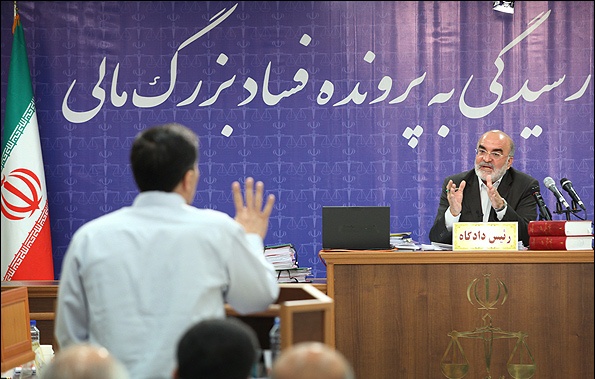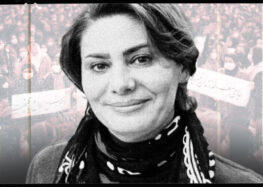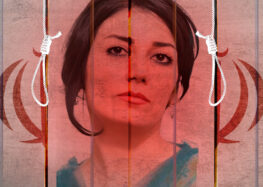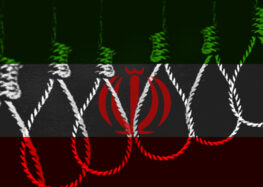Iran’s Corruption Courts Handing Out Death Sentences While Trampling on Rights to a Fair Trial

Five Death Sentence Issued in Preliminary Rulings, Two Upheld by Supreme Court
November 7, 2018—Special courts set up by Iran’s judiciary and approved by Supreme Leader Ali Khamenei in August 2018 to try individuals accused of economic corruption—and which have already sentenced five individuals to death—are gravely violating the right to due process and the right to a fair trial in Iran.
The Center for Human Rights in Iran (CHRI) calls on the authorities in Iran to:
- Immediately annul all death sentences and review all other sentences that have been issued by these courts.
- Amend the procedures established for these courts to ensure due process.
- Suspend functioning of these courts until procedural changes are made that guarantee due process and the right to a fair trial.
CHRI calls on the UN and member governments to:
- Directly address to Iranian officials the violation of rights these courts represent.
- Request the immediate suspension of these courts, the immediate annulment of all death sentences issued by these courts, and review of all sentences issued.
“The Iranian judiciary’s corruption courts blatantly deny due process and the right to a fair trial, and need to be stopped before more people are sentenced to death,” said Hadi Ghaemi, CHRI executive director.
“Guilt must be proved in a court of law but the Iranian authorities seem to have already assigned guilt and these courts do not allow for a proper defense, even as death sentences are being handed out,” Ghaemi added.
The new corruption courts:
- Allow trials to remain closed at the judge’s discretion, preventing transparency.
- Do not allow adequate time for defense procedures.
- Restrict the right to choose counsel to the short list of state-approved lawyers that are designated for “national security” cases.
- Implement a blanket denial of clemency irrespective of mitigating circumstances.
- Allow the judge to keep a detainee in detention, without the possibility of bail, until the verdict is reached.
- Do not allow any appeal process except in cases involving the death penalty, and then appeals can only be made to the Supreme Court within 10 days.
Five Death Sentences Already Issued
On November 6, the special court for economic crimes in Fars Province sentenced two people to death, the local judiciary’s public relations office announced. Dariush Ebrahimian Bilandi and Younes Bahaeddini were charged with “organized disruption of the country’s banking and economic network.” They were also fined 1.5 trillion rials ($36.5 million USD) and all their properties were confiscated. The two have appealed to the Supreme Court.
These two death sentences came after three individuals had been sentenced to death by these courts in October. On October 1, 2018, judiciary Spokesman Gholam-Hossein Mohseni Ejei had announced death sentences for Hamid Bagheri, Vahid Mazloumin and Mohammad Esmaili Ghasemi.
Hamid Bagheri’s death sentence has been transferred to another branch of the Supreme Court for further review, his lawyer Mr. Ramezani told Mehr news agency on November 5. One of the charges against him is illegal trading of 366,000 tons of tar.
In remarks that illustrate the egregious lack of due process in these courts, attorney Ramezani said: “This case consists of 150 dossiers and we have only been able to read 80 of them and they have not given us enough time to read the rest.”
In other words, the judges in these courts are handing out death sentences without allowing defense attorneys to present a full or proper defense—the corruption courts’ mandatory time limits on the various legal steps and procedures do not give defense attorneys the time to even review the case material.
On October 21, Ejei announced that the Supreme Court had upheld the death sentences issued by the special court in Tehran against Vahid Mazloomin, known as the “[Gold] Coin King,” and Mohammad Esmail Ghassemi, known as Mohammad Salem, both gold and currency traders.
Dozens of Prosecutions Underway, Heavy Prison Sentences issued
The prison sentences being handed down by these corruption courts are also severe. Eghtesad Online reported on November 3, 2018, that Mia Mohammad Akhounzadeh, a citizen of Afghanistan, was sentenced to 20 years in prison, fined 21 billion rials ($49,850 USD) and all his properties confiscated by the court for economic crimes in Fars Province for “disrupting the country’s monetary and economic system through letters of credit.”
The court also sentenced Majid Liaghat, an Iranian, to 20 years in prison, fined 52.6 billion rials ($1.25 million USD) and suspended him from engaging in trade for two years for “hoarding foodstuffs [rice and lentils].”
On October 31, five currency traders went on trial in the special court in Tehran the ISNA News Agency reported—Peyman Arghavani, Mazan Ghayeni, Behdad Bahrami, Hamid Ansari, and Ehsan Safavi. The verdicts have not yet been issued but Fars News reported they are being accused of amassing more than $151 million USD in illegal profits.
On October 1, 2018, judiciary Spokesman Gholam-Hossein Mohseni Ejei announced 32 individuals (their names were withheld) were condemned to prison sentences for allegedly manipulating Iran’s gold and currency markets. Ejei told reporters five people were sentenced to 20 years in prison, three to 12 years, four to 10 years, and that the other 20 had received sentences ranging from one to eight years in prison.
There are serious concerns that many more trials will be held in these courts—and thus more rights violated. On October 1, 2018, Judiciary head Sadeq Larijani told a group of judicial officials, “The head of the Central Bank has given us a list of websites that have engaged in currency price-fixing. The prosecutors should summon their admins and issue ultimatums. It’s possible that some of their actions may constitute ‘corruption on earth,’ which carries the death penalty.”
These remarks by Iran’s own Judiciary head reflect a complete disregard for the requirements of lawful prosecution; these “admins” and their associated websites have been declared guilty before any investigation and/or trial has proven guilt, and the country’s judiciary chief is already discussing a possible sentence—death.
State is Blaming the Traders, Guilt is Assumed
Ayatollah Mohsen Mojtahed Shabestari, a member of Iran’s Expediency Council, while taking a swipe at the Rouhani administration for its negligence in dealing with “hoarders,” promoted the state’s primary narrative that it is individual traders that are responsible for the country’s economic woes and as such, they deserve the death penalty. In this narrative, guilt has been assigned and confirmed—before any investigative or judicial proceedings. There is no discussion of the imperative of evidence and death sentences for convictions in these courts are pushed by senior state officials in judicial proceedings that will not allow defendants the time or independent legal counsel to mount a defense. In an interview with the Azad News Agency (ANA) on November 1, Mojtahed Shabestari said:
“Unfortunately, the country is not being looked after properly and hoarders are taking advantage of this situation and causing further price increases. I am in favor of executing people committing ‘corruption on earth’ because the action will uproot corruption. Disrupting the country’s economic system is an act of ‘corruption on earth’ and any negligence in confronting this issue is considered treason toward the people. If we don’t deal with the crimes committed by economic saboteurs we cannot establish justice.”
Reading the indictment against the five currency traders accused on October 31, Abbas Hosseini, the prosecutor’s representative, reiterated the prevailing state narrative on the corruption and currency fluctuations plaguing the country: individual traders are guilty and should be severely punished. He said:
“Economic saboteurs and greedy individuals have disrupted the market, caused an increase in prices and unprecedented depreciation of the national currency even before America imposed sanctions on the country. When the government injected foreign currency into the market through licensed currency traders in order to counter the drop in the rial… some traders took advantage of the situation and acted as pawns for the enemy.”
Judiciary Spokesman Gholam-Hossein Mohseni Ejei said on October 22 that these special courts had also been set up in Isfahan and Hormozgan provinces. The choice of Hormozgan province is potentially significant because of the illicit trade that is carried out through the Persian Gulf from this province. This could portend many more prosecutions that would lack due process or a fair trial.
Courts Established by Judiciary’s Request, Approved by Khamenei
The judiciary’s request to the supreme leader for these courts stated, “Given that the current special economic situation is considered a form of economic war, and the need to firmly and quickly deal with crimes unfortunately being committed by economic saboteurs and corrupt individuals in line with the objectives of the enemy, Your Excellency’s permission is requested to carry out the following actions, if you see fit, in accordance with the Law Against Economic Saboteurs and the Islamic Penal Code:
1) Setting up branches of the Islamic Revolutionary Court, based on Note 6 of Article 2 of the said law, comprised of three judges having at least 20 years of judicial experience.
2) These branches will be located in Tehran and all related cases will be submitted by the First Deputy Judiciary Chief. Branches will be set up in the provinces if the Judiciary Chief deems it necessary.
3) With the approval of the presiding judge, the trials will be held in public and the media may report on them.
4) The necessary legal steps required in the Criminal Procedures Regulations, such as issuing warrants and lodging appeals, will be carried out within no more than five days.
5) The Note to Article 48 of the Criminal Procedures Regulations (regarding prisoners accused of national security crimes) will be applied in regards to the appointment of lawyers.
6) If the court finds irrefutable evidence of fault in the investigations, the court itself can take direct action to complete the investigations.
7) Cases involving charges against civilians, state officials or military personnel will be handled by a single branch.
8) Any suspension of sentences or clemency toward economic saboteurs and criminals is prohibited.
9) In all cases the judge, if necessary, can order suspects to remain in temporary detention until a final verdict is issued. Detentions cannot be challenged in other courts, other than those handling these cases.
10) Verdicts issued by these courts, except capital punishment, are final and must be enforced. Death sentences can be appealed to the Supreme Court within 10 days.
11) The particulars of this order will be prepared and approved by the Judiciary Chief.
12) This order will be in effect for two years after approval.
Supreme Leader Ayatollah Ali Khamenei replied to the judiciary, “I agree to your request with the intention to punish acts of economic corruption quickly and fairly.”
Corruption Courts Are Yet Another Example of the Judiciary’s Disregard for the Law
In addition to the corruption courts’ denials of the rights to due process and a fair trial, and the state’s assumption of guilt that they reflect, these courts have been established in a context of growing violations of law by the Iranian judiciary. The refusal of the judiciary to defend citizens against rights violations by the state; the blanket approval of routine denials of due process and a fair trial; the intensified restrictions on counsel that now allow defendants in any “national security” case to pick only from a list of state-approved attorneys; and the growing number of lawyers the judiciary has put behind bars for trying to defend their clients, all speak to a judiciary that has dismissed any obligations to follow the rule of law.
The United Nations and the European Union have repeatedly called on Iran to address serious violations of due process and the right to a fair trial.
“These corruption courts represent yet another arena of judicial abuse in Iran,” said Ghaemi. “The judiciary is supposed to defend the law—and citizens’ protections under that law. Instead, the Iranian judiciary is leading the way in trampling citizens’ rights and defending the system that allows this.”






